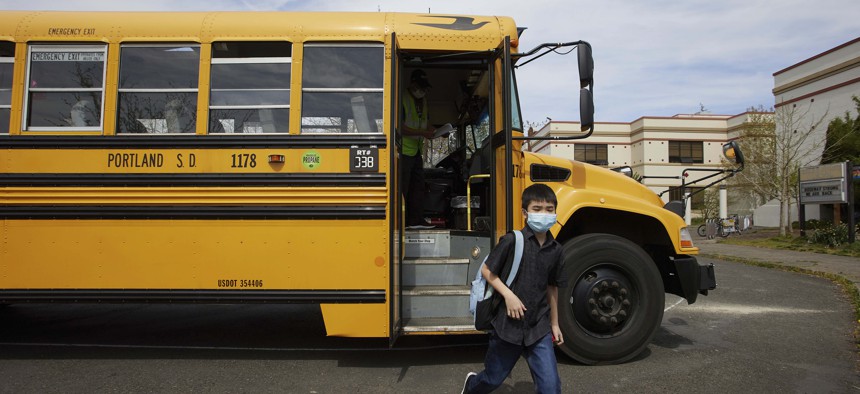Deploying the National Guard to Fill a School Bus Driver Shortage

A student gets off the bus at Roseway Heights Middle School on the first day of in-person hybrid learning on Monday, Apr. 19, 2021 in Portland, Ore. Craig Mitchelldyer/AP Images for Portland Public Schools
Schools across the country are finding it difficult to recruit and retain school bus drivers.
States have deployed National Guard troops during the last year to assist in nursing homes, support Covid-19 vaccination efforts, and quell unrest over police violence.
Now one state is deploying its National Guard to solve another pressing issue: the shortage of bus drivers.
As school districts across the country have reopened for in-person classes this fall, many are finding it difficult to transport students to and from class. The pandemic has exacerbated the difficulty of hiring bus drivers, with 51% of companies and school districts describing their driver shortage as “severe” or “desperate.”
To fill the gap, Massachusetts Gov. Charlie Baker announced this week that he will activate the National Guard to assist with school transportation in several cities this school year. Through an executive order, the governor is making 250 guard personnel available to transport students to school in four small cities: Chelsea, Lawrence, Lowell and Lynn. Ninety guard members began training to operate school transport vehicles on Tuesday with some expected to begin driving students to school by the end of the week, said Timothy McGuirk, a spokesman for the governor.
Driver assistance may be made available in other cities and the governor’s order leaves the time frame for deployment open ended, McGuirk said.
The school bus driver shortage isn’t unique to Massachusetts. School districts across the country are having trouble finding enough drivers to staff routes.
In Pittsburgh, that means last-minute robocalls to parents alerting them on days that their children will not be picked up by the bus. The Chicago Public Schools are offering students up to $1,000 a month to cover their own transportation to school after more than 70 bus drivers quit because they did not want to comply with the district’s vaccine mandate.
The positions are traditionally difficult to fill—they are typically low-paying jobs but require irregular hours and that makes it difficult for workers to take a second job. School bus drivers are also required to obtain a commercial driver’s license, which can take several weeks or months to complete.
Multiple factors are negatively impacting the ability of companies and school districts to recruit and retain school bus drivers, including the rate of pay and hours worked, the length of time it takes to obtain a commercial driver’s license, and the availability of benefits, according to a recent survey.
With schools closed last year and the pandemic spurring growth in the delivery service sector, schools are in competition with FedEx and Amazon for drivers. Similar competition has also left local governments without enough trash and recycling truck drivers.
To address the shortage, school districts have had to adjust school transportation routes and are stepping up efforts to recruit drivers. The Glassboro School District in New Jersey, for example, changed students’ schedules to allow for early release and transportation of high school students in order to stagger the bus routes. Fairfax County Public Schools in Virginia recently advertised a $3,000 signing bonus for new drivers. The district is also offering a five-week commercial driver’s license training program paid by the county and is starting new drivers at $23 an hour.
The plan to use National Guard members in Massachusetts has gained attention outside the state. Since Baker announced the order Monday, McGuirk said his office has received multiple inquiries from officials in other states interested in learning more.
Andrea Noble is a staff correspondent with Route Fifty.
NEXT STORY: Liberals Think Gun Violence is a Big Problem, Conservatives Not So Much





